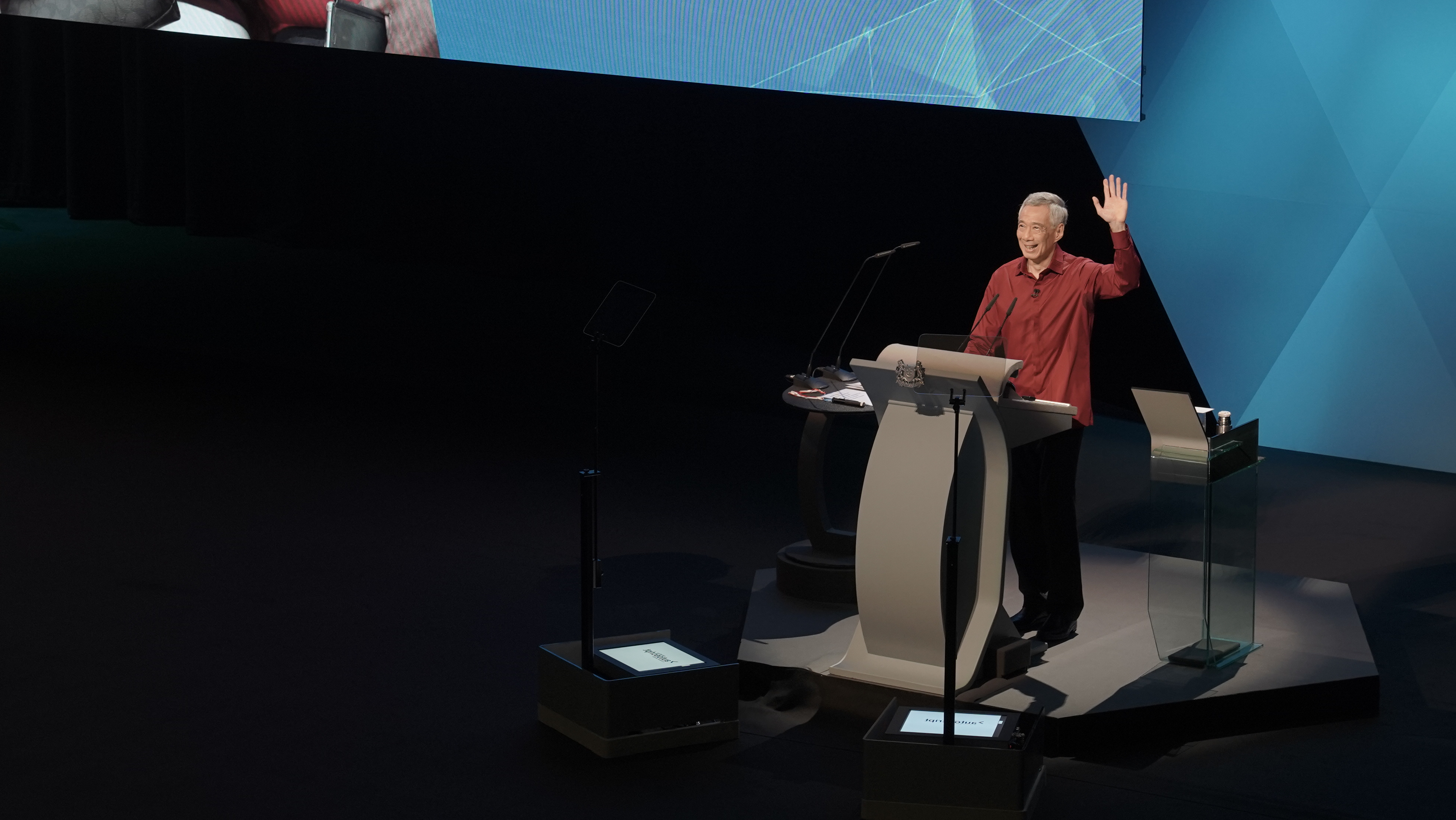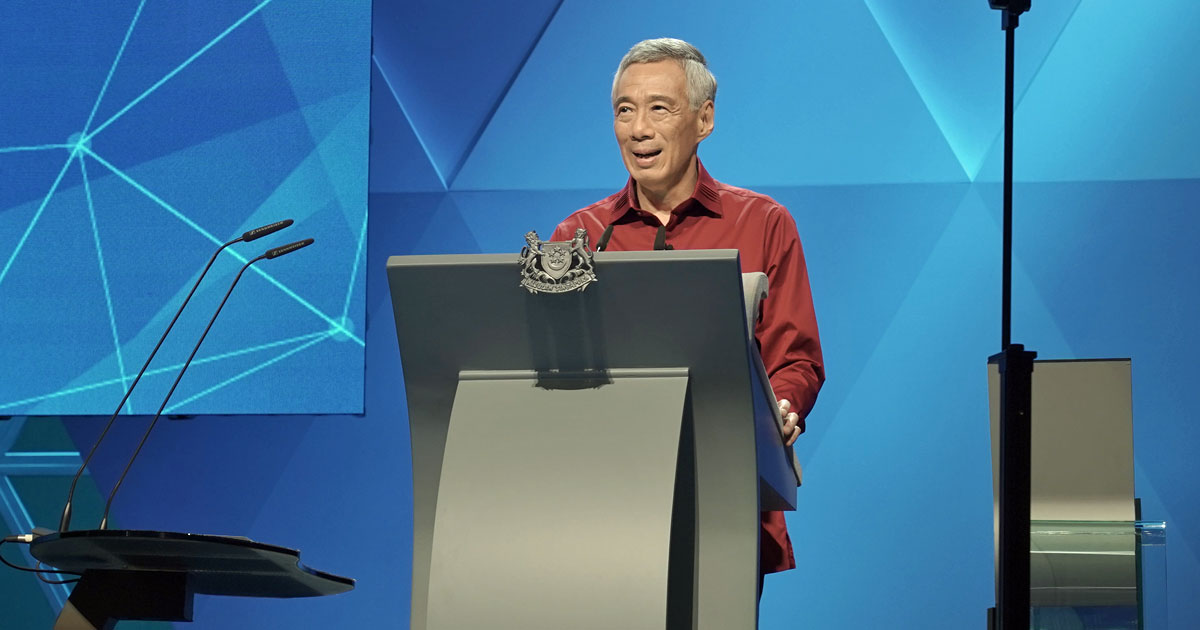Prime Minister Lee Hsien Loong delivered his 16th National Day Rally — possibly one of his most comprehensive and forward-looking ones ever, too — on Sunday, Aug. 18, 2019.
Speaking at the Institute of Technical Education (ITE Central) in Ang Mo Kio, PM Lee spoke about the short-term (Singapore's economy), medium-term (current U.S.-China tensions) and long-term challenges (climate change) facing the nation.
He also implemented new measures that addressed the young (government-supported preschool education), families (subsidies for childcare), and the elderly (raising the retirement age from 62 to 65, raising the re-employment age from 67 to 70, and to increase CPF contributions for older workers).
 Photo by Rachel Ng.
Photo by Rachel Ng.
Here are five conclusions we drew from this NDR:
1. The next general election is most likely going to be in 2020.
Earlier this month, there was a WhatsApp message going around claiming that the elections were going to be on Sep. 21, 2019.
This is quite definitely untrue.
The Elections Department (ELD) also said there was yet another WhatsApp message that asked people to sign up for a "general election project", even requesting personal information from people. And as you might expect — no, that wasn't from them either.
Anyway, PM Lee gave two hints during the NDR that the GE will not be called so soon.
- He said the government has "a full agenda".
- He showed that they are ramping up to do more in next year's budget.
He mentioned that the government will help businesses adjust to the new arrangements of raising both the retirement age and re-employment age for employers.
Those studying political tea leaves would have noticed this line from PM:
"We will implement a support package for them. DPM Heng Swee Keat will announce this in next year's Budget (our emphasis)."
2. This was PM Lee's 1st major speech on U.S.-China relations delivered to our local Chinese-speaking audience
You might recall that in May this year, PM Lee spoke extensively on U.S.-China relations in a major speech he gave at the 18th Shangri-La Dialogue.
But this was his first time speaking about the implications of this in Mandarin, and to a domestic audience.
PM Lee said the two countries' "disagreement has placed other countries in a dilemma", because "no one wants to take sides, and Singapore is no exception".
He is less optimistic about the tensions in the short-term, saying that both China and the U.S. have regrettably "yet to find the magic pill to manage their differences", and this will impact the world order.
PM Lee explained Singapore's dilemma when the U.S. and China are at odds:
"If we support China, the U.S. and other countries may think we do so because we are a majority Chinese country and therefore accede to China.
But if we support the U.S., China may also misunderstand. In fact, on occasions when Singapore and China have held different views in the past, some of our friends from China have asked us: Since we share a common language, a common ancestry and a common heritage, why does Singapore not share a common view?"
And this is why Singapore "must always be principled in our approach, and not swayed by emotions", he concluded.
He added that if Singapore cannot agree with either major power, Singapore has to "explain our stand" in the context of us as a "multicultural, independent and sovereign country".
Importantly, PM Lee said "Singaporeans ourselves must fully understand what are our national interests and what are the government’s considerations in adopting our positions".
https://mothership.sg/2019/08/national-day-rally-chinese-china-us-tensions
3. PM touched on different issues in his 3 speeches
In a break from past NDRs, PM Lee decided to address completely different issues in his Malay, Chinese and English speeches.
And so it does seem that PM Lee was trying to cram as many issues as he could in this year's rally.
In his Malay speech, PM Lee spoke about Singapore's unique Malay identity, and described the strides made by the Malay-Muslim community in education.
He also touched upon Islam, and how it is practised in the spirit of “mutual respect, tolerance and inclusiveness” in Singapore society.
In his Chinese speech, PM Lee charted the history of Chinese communities and their contributions to Singapore, noting how the Chinese Singaporean identity was formed gradually over the last 200 years.
And as we mentioned earlier, he talked about U.S.-China tensions and how the tensions will adversely impact the economy.
In his English speech, PM Lee spoke about three things:
1) Enabling every young person to succeed, regardless of his or her background;
2) Supporting people who want to work longer as Singaporeans' life expectancy grows;
3) Protecting Singapore from climate change, and renewing the city for the next century.
So the substance of PM's NDR last night was not covered in just the one-hour-and-20-minute English speech, but in the slightly more than two hours of his trilingual exposition of Singapore's past and future.
Whew.
4. A fierce & urgent pivot toward climate change
For some Singaporeans, the challenges of climate change seem too distant and not sufficiently relatable to think about.
So in his NDR, PM Lee used a national defence analogy to urge Singaporeans to rethink this notion.
He compared Singapore’s climate change defences to the Singapore Armed Forces — both were "life and death matters".
And he has prepared Singaporeans for long-term investments on addressing the challenges of climate change.
He said that Singapore may have to spend "probably S$100 billion" to protect our low-lying island against rising sea levels.
He added that the government has to "work steadily at it, maintain a stable budget year after year, and do it over many years and several generations. That way we can afford it, and when we need it, we will be ready".
Hence, Singapore has to implement its climate change plans "progressively, and keep them flexible", he said.
“Otherwise one day, our children and grandchildren will be ashamed of what our generation did not do," PM Lee warned.
If it helps, The Economist seems confident of Singapore's ability to address the climate change challenge of rising sea levels. In its latest issue, it noted that the world's governments must stop pretending that entire coastlines can be defended, "unless you are Monaco or Singapore".
5. Economy a concern, but not fully addressed in terms of new measures yet
As PM Lee unveiled plans to provide more support for preschool and tertiary fees, he decided to adopt a more cautious approach in economic stimulus measures, for now.
In his Chinese speech, PM Lee noted that Singapore's economic growth has slowed significantly this year.
He observed that the slump in electronics has impacted Singapore's overall economic performance, especially in precision engineering and wholesale trade. He also pointed out that retail continues to be under pressure from online shopping.
However, PM Lee said the "current situation does not warrant immediate stimulus measures", adding that the government will "promptly respond with appropriate interventions" if the situation gets much worse.
These remarks were made after the Ministry of Trade and Industry (MTI) last week slashed its full-year economic growth forecast from zero to 1 per cent from its previous 1.5-2.5 per cent projection.
This was the second time within a year that MTI lowered its projection.
 Photo by Rachel Ng.
Photo by Rachel Ng.
As PM Lee concluded his NDR, he said Singapore's current leaders will hand over smoothly to a new generation of leaders.
He repeated a phrase Deputy Prime Minister Heng Swee Keat said earlier this year, summing it up as "having an honest and capable government working together with you".
This year's NDR is a speech on Singapore's future, and is likely not to be an election NDR speech.
With some work to be done by the current government before the next GE, PM Lee appears to be passing the leadership baton to DPM Heng to make his 2020 Budget statement the curtain raiser to the next GE.
Top photo by Rachel Ng.
If you like what you read, follow us on Facebook, Instagram, Twitter and Telegram to get the latest updates.
